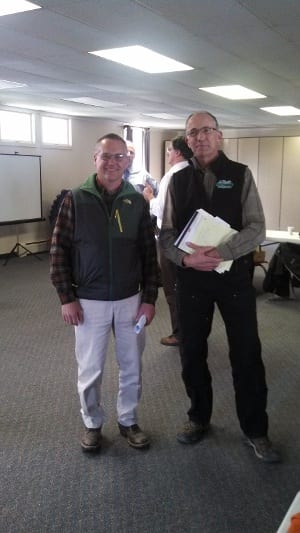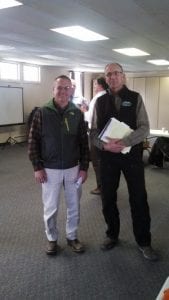
Over 80 participants attended the Vermont Biosolids Forum in 2013 held by the Vermont Department of Environmental Conservation in Waterbury, Vermont today. Among the attendees was  Lorenzo Whitcomb, photo left, a Vermont dairy farmer. Lorenzo imparted his experience using biosolids as an alternative fertilizer sharing a letter he had written to his neighbors when he first began applying biosolids to his fields. The letter read as follows,
Lorenzo Whitcomb, photo left, a Vermont dairy farmer. Lorenzo imparted his experience using biosolids as an alternative fertilizer sharing a letter he had written to his neighbors when he first began applying biosolids to his fields. The letter read as follows,
To: Our Essex Neighbors
From: Whitcomb Family Farm
Date: August 20, 2009
Re: Use of Local Biosolids as Fertilizer
We are writing to share some information about our dairy farm and the proposed use of biosolds as fertilizer to grow livestock feed.
About six years ago we approached Jim Jutras of the Essex Junction Waste Water Treatment Plant about using Essex biosolids as fertilizer on our farm. At the time, the biosolids were being trucked to Canada.
We currently farm in two locations, Essex Junction and North Williston. Our milking herd is in Williston and our young stock in Essex. The cows at our Essex Farm don’t make enough manure to fertilize all the crops. We are currently relying on commercial fertilizer to supply our additional needs. The idea of using a safe locally produced fertilizer is very appealing both economically and as a community service. Keeping any farm sustainable involves keeping the soil nutrients at optimum levels and not depleting the nutrient levels of the soil. We have the experience and equipment to handle the biosolids in a timely and environmentally safe way.
Whitcomb Farm has previously used biosolids with very good results. The biosolids would be used for cow crops only. The biosolids and groundwater will be tested by the Village of Essex Junction and the soil testing will be done by Whitcomb Farm’s private crop consultant.
Since Whitcomb Farm will be applying the biosolids, we will adhere to all setbacks and site criteria. Biosolids would be tilled into the soil after application.
Biosolids will come exclusively from the Essex Junction Waste Water Treatment Plant. In no way should treated biosolids be mistaken as raw sewage.
Lorenzo Whitcomb
Also included at the forum were presentations on the recycling of biosolids and the land application of biosolids. Learn more about RMI’s biosolids soil amendments here.